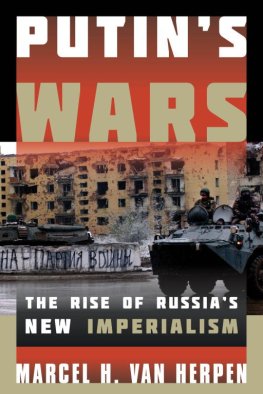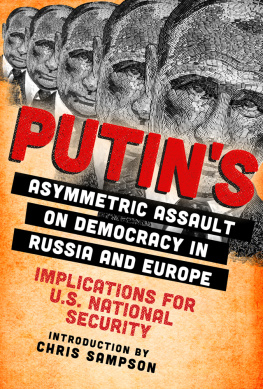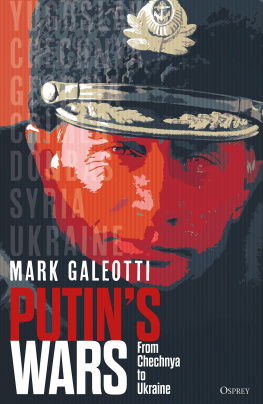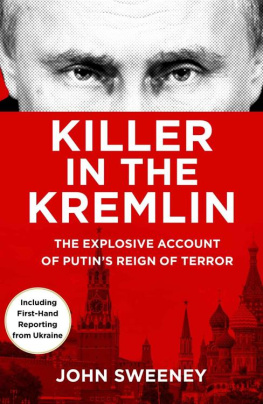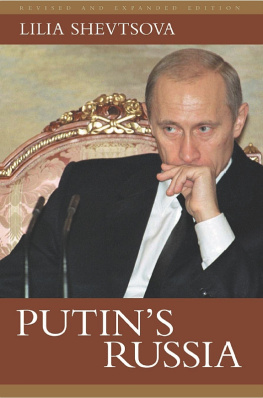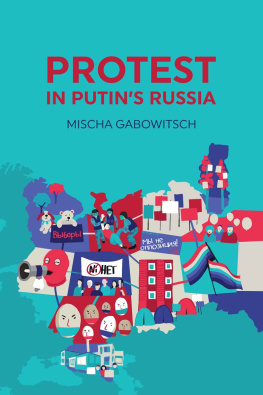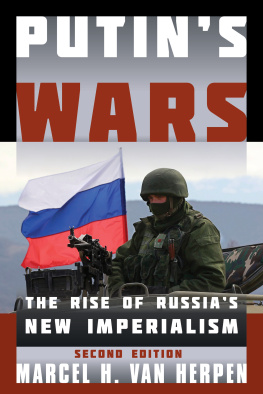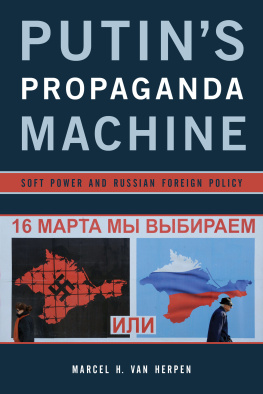Marcel H. Van Herpen
PUTINS WARS
The Rise of Russias New Imperialism
To Valrie, Michiel, and Cyrille
Author Note and Acknowledgments
English quotes of Russian, French, German, Dutch, Italian, and Spanish works were translated by the author.
In writing this book I owe a lot to the discussions with the members of the Russia Seminar of the Cicero Foundation. I want to thank Emma Gilligan, Hall Gardner, Christiane Haroche, Rona Heald, Albert van Driel, Peter Verwey, and Ernst Wolff, who read chapters of the book and gave useful feedback. I want to thank also Susan McEachern, Carolyn Broadwell-Tkach, and Jehanne Schweitzer, who, with great professionalism, shepherded the book through the editorial production process. Finally, I want also to thank my wife, Valrie, who gave me her patient support during the years of research and writing. I dedicate this book to her and to my two sons, Michiel and Cyrille, who share their fathers interest in Russian history.
Glossary and Abbreviations
ANC African National Congress
ANI Associazione Nazionalista Italiana
BBC British Broadcasting Corporation
BRIC Acronym of grouping referring to Brazil, Russia, India, and China
BRICS Acronym of grouping referring to Brazil, Russia, India, China, and South Africa
BRIICS Acronym of grouping referring to Brazil, Russia, India, Indonesia, China, and South Africa
CFE Conventional Forces in Europe Treaty
CIA Central Intelligence Agency (USA)
CIS Commonwealth of Independent States
CaPRF Cossack Party of the Russian Federation
Cheka All-Russian Extraordinary Commission for Combating Counter-Revolution and Sabotage (Soviet secret service December 19171922)
CPRF Communist Party of the Russian Federation
CPSU Communist Party of the Soviet Union
CSTO Collective Security Treaty Organization
CU Customs Union
DMD Dobrovolnye Molodezhnye Druzhiny (Voluntary Youth Militias)
DPNI Dvizhenie protiv nelegalnoy immigratsii (Movement Against Illegal Immigration, extreme right organization)
EU European Union
EurAsEc Eurasian Economic Community
FSB Federalnaya Sluzhba Bezopasnosti (Federal Security Service of the Russian Federation)
GDP Gross Domestic Product
GRU Glavnoe Razvedyvatelnoe Upravlenie (Main Intelligence Directorate, Russian Military Foreign Intelligence Agency)
HJ Hitlerjugend (Hitler Youth)
IMF International Monetary Fund
ITAR-TASS Russian News Agency
KGB Komitet Gosudarstvennoy Bezopasnosti (Committee for State Security, secret service of the Soviet Union)
KOMSOMOL Kommunisticheskiy Soyuz Molodezhi (Communist Youth Union, youth department of the Communist Party of the Soviet Union)
KTO kontrterroristicheskie operatsii (counterterrorist operations)
LDPR Liberal-Democratic Party of Russia
MAP Membership Action Plan (NATO)
MID Ministerstvo Inostrannykh Del Rossiyskoy Federatsii (Ministry of Foreign Affairs of the Russian Federation)
NATO North Atlantic Treaty Organization
NSDAP Nationalsozialistische Deutsche Arbeiterpartei (National Socialist German Workers Party)
OPEC Organization of the Petroleum Exporting Countries
PARNAS Partiya Narodnoy Svobody (Peoples Freedom Party)
ROC Russian Orthodox Church
OAS Organisation de larme secrte (French far-right paramilitary organization)
PACE Parliamentary Assembly of the Council of Europe
PA CSTO Parliamentary Assembly of the CSTO
PDPA Peoples Democratic Party of Afghanistan (Communist Party of Afghanistan)
RIA NOVOSTI Russian News Agency
ROSMOLODEZH Russian Federal Youth Agency
SA Sturm Abteilung (paramilitary organization of Hitlers NSDAP)
SCO Shanghai Cooperation Organization
SdP Sudetendeutsche Partei (Sudeten German Party)
SED Sozialistische Einheitspartei Deutschlands (Communist Party of the German Democratic Republic)
UAV Unmanned Aerial Vehicle
USA United States of America
USSR Union of Soviet Socialist Republics
VAD All-Russian Association of Militias
VTsIOM All-Russian Center for the Study of Public Opinion (official state pollster)
WTO World Trade Organization
In December 1991 the Soviet Union ceased to exist. The end of the last European empire came suddenly and unexpectedly, not least for the Russians themselves. However, with hindsight it seemed to be the logical conclusion of a chapter in European history. Other European countries had gone down the same road. Spain had already lost its colonies in the nineteenth century. France, Britain, Belgium, and the Netherlands had decolonized after World War II. Even Portugal, a colonialist laggard that clung to its possessions in Africa and Asia until the bitter end, had to give up its empire after the carnation revolution of 1974. Decolonizationuntil nowhas seemed to be an irreversible process: once a former colony had obtained its independence, it was unlikely that the former colonial power could make a comeback. The history of European decolonization has been, so far, a linear and not a cyclical process. The chapter of European colonialism seems to be closed definitively, once and for all. But is it? Does this analysis also apply to Russia? This is the big question because not only the conditions under which Russia built its empire were quite different than for the other European countries, but also because the process of decolonization was different. Let us consider these differences. There are, at least, five:
First, Russia did not build its empire overseas, as did the other European powers. Its empire was contiguous and continental: the new lands it acquired were incorporated in one continuous landmass.
Second, with shorter communication lines and no need to cross oceans, rebellions and independence movements in the colonized territories could be more easily repressed.
Third, Russian empire building was also different because it did not come after the process of state-building, as was the case in Western Europe. In Russia it was an integral part of the process of state-building itself.
Fourth, Russian empire building was neither casual, nor primarily driven by commercial interests, as was the case in Western Europe, but from the start, it had a clear geopolitical function, namely, to safeguard Russias borders against foreign invaders.
Fifth, in Russian history periods of decolonization were never linear, nor irreversible. Decolonization was never definitive. When, for instance, after the Bolshevik Revolution, the colonized lands of the Russian empire were set free, they were soon afterwards reconquered by the Red Army.
It is these five historical characteristics of Russian colonization and decolonization that one has to bear in mind when analyzing the behavior of the Russian leadership. The thesis of this book is thatunlike in Western Europe, where the process of decolonization was definitivethe same is not necessarily true for Russia. For the Russian state colonizing neighboring territories and subduing neighboring peoples has been a continuous process. It is, one could almost say, part of Russias genetic makeup. The central question with which we are confronted after the demise of the Soviet Union is whether this centuries-old urge to subdue and incorporate neighboring peoples has disappeared or if this imperial reflex might be making a comeback.
According to some authors the end of the Soviet Union sounded the death knell of Russian colonialism and imperialism. One of these authors is Dmitri Trenin, a Russian analyst and the head of the Moscow bureau of the Carnegie Endowment for International Peace. In his book, with the telling title

